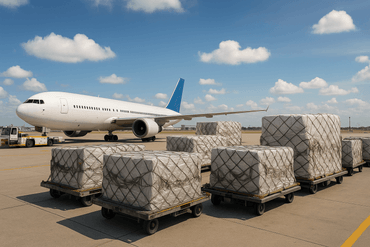
Chinese New Year Shipping Delays: Tips for Minimizing Impact



One of the most important festivals in China and many other Asian nations is Chinese New Year (CNY). Even if it's a time for celebration, the global supply chain faces difficulties. Widespread delays may result from this vacation, especially in the shipping and transportation industries. Knowing these effects and planning ahead are essential for companies that depend on products that are supplied from or produced from Asia. Here, we examine how Chinese New Year affects logistics and offer doable solutions to lessen its consequences.
Recognizing How Chinese New Year Affects Logistics
Chinese New Year is celebrated for around two weeks, usually from late January to mid-February. However, when industries and ports in China and surrounding nations slow down or shut down completely in preparation for the holiday, the repercussions on logistics frequently last beyond this time frame.
Closing of Factories
During CNY, many Chinese workers take long vacations, and factories often close for at least two weeks. Order fulfillment is delayed as a result of production stopping. To give employees time to return to their hometowns, some factories may halt operations a week or more prior to the official holiday, prolonging the duration of interruption.
Congestion in Ports
Before CNY, Chinese ports are busy as companies scramble to ship orders in time for the holiday. The processing and delivery of items may be delayed as a result of the extreme congestion caused by this increased demand. There is frequently a backlog of containers to be removed after the holiday, which adds to the delays.
Lack of Workers
Not every employee returns to work right away after the holiday. Some people look for other prospects, which leaves manufacturing and logistics firms understaffed. The return to regular operations may be delayed by this manpower scarcity.
Effects of Global Ripples
Due to China's significant role in international commerce, supply networks throughout the world are frequently affected by interruptions during CNY. Increased freight costs, unmet orders, and delayed delivery can affect companies in a variety of sectors.
Techniques to Reduce the Effects of CNY Shipping Postponements
Businesses may take preemptive measures to lessen the impact of Chinese New Year, even if it presents major hurdles. The following are important tactics to think about:
1. Make a plan
Planning well in advance is the best strategy to reduce delays caused by CNY. To guarantee that your items are made and dispatched before the holiday, place your orders in advance. To prevent last-minute traffic, try to complete orders at least two months before to CNY.
2. Interact with Vendors
It is crucial to keep lines of communication open with suppliers. In order to match your plans with their availability, talk about their production timetables and holiday schedules. Make sure they understand your goals and provide clear expectations for deadlines.
3. Make Supply Chains Diverse
During CNY, it might be dangerous to rely only on Chinese providers. By sourcing from nations or areas not impacted by the vacation, you may diversify your supply chain. This strategy can assist in keeping the flow of commodities constant throughout the interruption.
4. Raise Stock Levels
Make sure you have enough product well in advance of the holidays. While waiting for manufacturing and shipping to begin after CNY, having enough inventory on hand might assist satisfy consumer demand.
5. Cooperate with forwarders of freight
Freight forwarders who know how to handle CNY interruptions can be quite helpful. In order to reduce delays, they may assist you with managing customs procedures, securing space on ships, and offering advice on other shipping routes.
6. Keep an eye on market trends
In the run-up to CNY, pay attention to freight prices and market movements. It's crucial to account for greater shipping expenses during this time since rising demand frequently results in higher freight rates.
7. Put Technology to Use
Use technology to improve the visibility of your supply chain. Predictive analytics and real-time tracking are two tools that can help you foresee delays and modify your plans appropriately.
Recovery After CNY: What to Anticipate
The week after Chinese New Year might be just as difficult. Businesses should get ready for the following:
- Backlogs at Ports: As ports attempt to clear the backlog of containers that developed over the holiday, expect increased wait times.
- Extended Production Times: In the event of a manpower shortage, factories may require several weeks to return to full production capability.
- Shipping Schedule Changes: In order to meet post-holiday demand, carriers may make changes to their timetables, which might affect travel times.
- Keep your supply chain plans flexible and keep in touch with your logistics partners and suppliers to ensure a seamless recovery.
In conclusion
Global logistics face several obstacles during Chinese New Year, but companies may lessen the effects with early preparation and strategic approaches. Successfully navigating this time requires early ordering, contact with suppliers, inventory control, and cooperation with knowledgeable freight forwarders. Businesses can guarantee continuity and uphold customer satisfaction even during one of the most disruptive periods in the shipping calendar by planning ahead and staying flexible.
- 1. Recognizing How Chinese New Year Affects LogisticsClosing of FactoriesCongestion in PortsLack of Workers
- 2. Effects of Global Ripples1. Make a plan2. Interact with Vendors3. Make Supply Chains Diverse4. Raise Stock Levels5. Cooperate with forwarders of freight6. Keep an eye on market trends7. Put Technology to Use
- 3. Recovery After CNY: What to Anticipate
- 4. In conclusion
Related Articles


